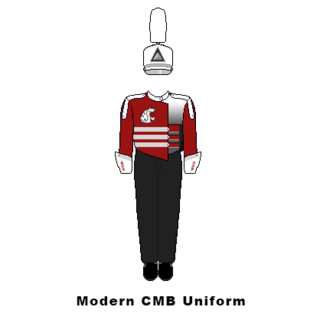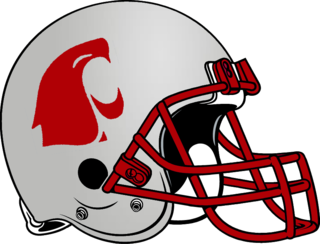Related Research Articles

Washington State University is a public land-grant research university in Pullman, Washington, United States. Founded in 1890, WSU is also one of the oldest land-grant universities in the American West. With an undergraduate enrollment of 24,278 and a total enrollment of 28,581, it is the second largest institution for higher education in Washington state behind the University of Washington. It is classified among "R1: Doctoral Universities – Very high research activity".

The Apple Cup is an American college football rivalry game between the University of Washington Huskies and Washington State University Cougars, the two largest universities in the state of Washington. Both were members of the Pac-12 Conference until 2024.

Beasley Coliseum is a general-purpose indoor arena in the northwest United States, located on the campus of Washington State University in Pullman, Washington. The home venue for the Cougars men's and women's basketball teams of the Pac-12 Conference, it opened 52 years ago in 1973, and its current seating capacity is 12,058 for basketball.

The Washington State Cougars are the athletic teams that represent Washington State University. Located in Pullman, Washington, WSU is a member of the Pac-12 Conference in NCAA Division I. The athletic program comprises ten women's sports and seven men's intercollegiate sports, and also offers various intramural sports.
Rogers Field was an outdoor athletic stadium in the northwest United States, on the campus of Washington State University in Pullman, Washington. It was the home venue of the WSU Cougars football and track teams until severely damaged by a fire in April 1970. Partially demolished in early 1971, Rogers Field was replaced by the concrete Martin Stadium, which was built on the same site and opened in 1972.

The Washington State UniversityCougar Marching Band is the marching band of Washington State University. With over 200 members, the Cougar Marching Band performs at every home football game and select away games.
The Washington State Cougars men's basketball team represents Washington State University and competes in the West Coast Conference (WCC) of NCAA Division I. The Cougars play their home games on campus in Pullman at Beasley Coliseum, which has a capacity of 12,058. They are currently led by head coach David Riley.
The Battle of the Palouse refers to an athletic rivalry in the northwest United States, between the Vandals of the University of Idaho and Cougars of Washington State University.
Frederick Charles Brayton, usually known as Chuck Brayton or Bobo Brayton, was an American college baseball head coach; he led the Washington State Cougars for 33 seasons, from 1962 to 1994. He is the winningest coach in school history, with a record of 1,162 wins, 523 losses and eight ties—the fourth-best total in NCAA history at the time he retired.

The 1975 Washington State Cougars football team was an American football team that represented Washington State University in the Pacific-8 Conference (Pac-8) during the 1975 NCAA Division I football season. In their eighth season under head coach Jim Sweeney, the Cougars compiled a 3–8 record (0–7 in Pac-8, last) and were outscored 295 to 262.

The 1974 Washington State Cougars football team was an American football team that represented Washington State University in the Pacific-8 Conference (Pac-8) during the 1974 NCAA Division I football season. In their seventh season under head coach Jim Sweeney, the Cougars compiled a 2–9 record, and were outscored 272 to 162.

The 1964 Washington State Cougars football team was an American football team that represented Washington State University in the Athletic Association of Western Universities (AAWU) during the 1964 NCAA University Division football season. In their first season under head coach Bert Clark, the Cougars compiled a 3–6–1 record, and were outscored 208 to 165.

The 1959 Washington State Cougars football team was an American football team that represented Washington State University as an independent during the 1959 college football season. In their fourth season under head coach Jim Sutherland, the Cougars compiled a 6–4 record and outscored their opponents 177 to 121.

The 1966 Washington State Cougars football team was an American football team that represented Washington State University in the Athletic Association of Western Universities (AAWU) during the 1966 NCAA University Division football season. Led by third-year head coach Bert Clark, the Cougars compiled a 3–7 record, and were outscored 211 to 132. Two home games were played on campus at Rogers Field in Pullman, and three at Joe Albi Stadium in Spokane.

The 1967 Washington State Cougars football team was an American football team that represented Washington State University in the Athletic Association of Western Universities (AAWU) during the 1967 NCAA University Division football season. In their fourth and final season under head coach Bert Clark, the Cougars compiled a 2–8 record, and were outscored 266 to 141.
The 1982–83 Washington State Cougars men's basketball team represented Washington State University for the 1982–83 NCAA Division I men's basketball season. Led by eleventh-year head coach George Raveling, the Cougars were members of the Pacific-10 Conference and played their home games on campus at Beasley Coliseum in Pullman, Washington.
The 1993–94 Washington State Cougars men's basketball team represented Washington State University for the 1993–94 NCAA Division I men's basketball season. Led by seventh-year head coach Kelvin Sampson, the Cougars were members of the Pacific-10 Conference and played their home games on campus at Beasley Coliseum in Pullman, Washington.
The 1983–84 Washington State Cougars men's basketball team represented Washington State University for the 1983–84 NCAA Division I men's basketball season. Led by first-year head coach Len Stevens, the Cougars were members of the Pacific-10 Conference and played their home games on campus at Beasley Coliseum in Pullman, Washington.
The 1971–72 Washington State Cougars men's basketball team represented Washington State University for the 1971–72 NCAA college basketball season. Led by first-year head coach Bob Greenwood, the Cougars were members of the Pacific-8 Conference and played their home games on campus at Bohler Gymnasium in Pullman, Washington.
The 1986–87 Washington State Cougars men's basketball team represented Washington State University for the 1986–87 NCAA Division I men's basketball season. Led by fourth-year head coach Len Stevens, the Cougars were members of the Pacific-10 Conference and played their home games on campus at Beasley Coliseum in Pullman, Washington.
References
- 1 2 Studwell, William (2001). College Fight Songs II: A Supplementary Anthology. Routledge. ISBN 078900920X.
- ↑ Sorensen, Eric (15 November 1997). "Even True Cougs Can't Wax Lyrical To Fight Song They May Carry Rose Bowl Hopes, But Few Can Carry This Tune". Spokesman-Review . Retrieved 25 October 2015.
- ↑ "Washington State University fight song". wsu.edu. Washington State University . Retrieved 25 October 2015.
- ↑ "WSU Vancouver is Crimson and (Fifty Shades of) Grey". KREM-TV . Archived from the original on 30 April 2015. Retrieved 25 October 2015.
- ↑ "WSU Graduate Tom Tuttle from Tacoma". wsucougars.com. Washington State University . Retrieved 25 October 2015.
- ↑ "Men's basketball reveals new jersey design". news.wsu.edu. Washington State University . Retrieved 25 October 2015.
- ↑ Brown, Andrea. "WSU store opens doors in downtown Everett". Spokesman-Review . No. 24 May 2014. Retrieved 25 October 2015.
